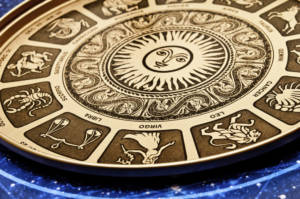Astrology 101: An Introduction

Astrology is gaining renewed interest in popular culture. To better understand these trends, it helps to have a basic knowledge of astrology itself.
A January 2018 piece in The Atlantic reveals that astrology is gaining renewed interest in popular culture, especially from adults under age 40. Astrology websites are seeing more traffic than ever, sun signs and horoscopes are rich meme fodder, and daily horoscopes are getting up to three times more readership than in decades past. So what gives? To better understand these trends, it helps to have a basic knowledge of astrology itself.
What Is Astrology?
The Encyclopedia Britannica describes astrology as a method of divination focused on observing and interpreting the positions of planets, stars, and the sun. Three different astrological systems are commonly used today:
- Western, based on Greek and Babylonian traditions
- Vedic, which relies on the idea that all things in the universe are linked
- Chinese, which assigns astrological signs to years instead of month-long periods
The early foundations of Western astrological practices come from “Tetrabiblos,” a text written by Greco-Roman astrologer Claudius Ptolemy during the second century B.C.E. Meanwhile, Vedic astrology takes its cues from 15th century B.C.E. text “Vedanga Jyotiṣa” and was possibly influenced later by Hellenistic thought. Chinese astrology draws from traditional philosophical ideas such as the five-elements theory and the yin-yang principle.
What Are Zodiac Signs?
You probably know about zodiac signs from the horoscopes or lists of personality traits you’ve read. What you may not know is that each sign corresponds with a constellation in the night sky, with most representing Greek mythological figures. Twelve signs appear in both the Western and Vedic zodiac systems, grouped into four categories by the classical Greek elements with which they’re associated:
- Fire: Aries, Leo, and Sagittarius
- Earth: Taurus, Virgo, and Capricorn
- Air: Gemini, Libra, and Aquarius
- Water: Cancer, Scorpio, and Pisces
These signs are also classified as cardinal, fixed, or mutable depending on when they fall during a season. For instance, Cancer is a cardinal sign for summer while Leo is fixed and Virgo is mutable. AstroStyle explains that cardinal signs are thought to initiate energy while fixed signs maintain it and mutable signs prepare for transitions into the following season.
Sun Signs and Horoscopes
The methodologies used to create horoscopes may vary, but most rely on a person’s sun sign plus the position of the moon and a couple of significant planets in the night sky to pen some general advice. Your “sun sign” is shorthand for the constellation in which the sun appeared when you were born. The sun’s place in the sky changes according to Earth’s position in orbit, causing it to travel through an ecliptic divided into the 12 zodiac signs. In the Vedic system, the ecliptic is placed according to the positions of fixed stars, while Western astrology places the ecliptic based on the position of the sun at the celestial equator during the spring equinox.
The duration of each sun sign lasts around 30 days, but the Vedic system’s year begins with Aries on April 14 while the same point in the Western version occurs on March 21. That’s why someone whose birthday is on August 14 would have been born under the sign of Leo in Western astrology but under Cancer in Vedic astrology.
Astrology’s Enduring Popularity
As Julie Beck writes in her piece for The Atlantic, astrology tends to be viewed by most as metaphorical rather than literal. Even those who don’t believe in it, Beck clarifies, may find useful explanations for trends and major life events. Referring to this as the “astrology is fake but it’s true” stance, she observes that it’s a common concept among people who can successfully hold paradoxical beliefs and seek organization, order, and meaning while living in chaos. Perhaps it’s yet more proof that with uncertain or dim futures ahead, the human tendency to look for hope in forces greater than oneself endures.

